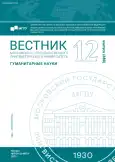On Specific Features of a Religious Humorous Discourse (a case study of Orthodox confession)
- Autores: Anisimova E.E.1
-
Afiliações:
- Moscow State Linguistic University
- Edição: Nº 12(880) (2023)
- Páginas: 9-17
- Seção: Linguistics
- URL: https://bakhtiniada.ru/2542-2197/article/view/323747
- ID: 323747
Citar
Texto integral
Resumo
The paper considers items connected with the study of a humorous religious discourse. The paper addresses specific features of humor in the sphere of religion, reveals the points of a religious humorous discourse, defines functions, factors, subjects and characteristic linguistic properties. The paper defines basic linguo-cultural models of the Orthodox religious discourse (Father, granny, dame), as well as defines universal and specific for the discourse concerned methods and means of comic image creation.
Palavras-chave
Sobre autores
Elena Anisimova
Moscow State Linguistic University
Autor responsável pela correspondência
Email: letanisimova@mail.ru
Doctor of Philology (Dr. habil.), Professor, Professor at the Department of Grammar and History of The German Language Faculty of the German Language Moscow State Linguistic University
RússiaBibliografia
- Karasik V. (2004) Yazy’kovoj krug: lichnost’, koncept, diskurs = Lingual sphere: personality, concepts, discourse. Moscow: Gnosis. (In Russ.)
- Lendvai E’yu. (2001): Pragmaticheskie mechanizmy’ sovremennogo anekdota = Pragmatic mechanisms of modern Russian jokes: abstract of senior doctorate in philology. Moscow. (In Russ.)
- Shmeleva E. Ya., Shmelev A. D. (2002). Russkij anekdot. Tekst I rechevoj zhanr = Russian jokes. Texte and genre. M.:Yazy’ki slavyanskoj kul’tury’. (In Russ.)
- Kulinich V.F. (2004) Lingvokulturologiya yumora (na materiale anglijskogo yazy’ka) = Linguocultural studies of humor (a case studies of the English language). Samara: Isdvo SGLU. (In Russ.)
- Miloslavskaya N.L. (2011) Nemezkij by’tovoj anekdot kak specificheskiy tip yumotisticheskogo diskursa = Common German language jokes as a specific type of humorous discourse: abstract of PhD in Philology. Ivanovo. (In Russ.)
- Roxlina T. A. (2017): Yazy’kovaya reprezentaciya komicheskogo v zhanrax nemeczkoj smexovoj kultury’ ( na primere nemeckogo shwanka) = Representation of comic images in the German joking in the context of prosaic schwank): abstract of PhD in Philology. Moscow. (In Russ.)
- Fernandes Santes Yu. V. (2017) Yumoristicheskij diskurs v ispanskoj i bakskoj lingvokul’turax: sopostavitel’ny’j analiz = Humorous discourse in the Spanish and Basque linguistic culture: comparative analysis : abstract of PhD in Philology. Moscow. (In Russ.)
- Zheltuxina M. P. (2000) Komicheskoe v politicheskom diskurse ХХ veka. Russkie i nemeczkie politiki = Comic images in political discourse of the late 20th century. Russian and German politicians abstract of PhD in Philology. Volgograd. (In Russ.)
- Kazakova D. V. ( 2013) Kategoriya komicheskogo v medicinskom diskurse = The humor in a medical discourse: abstract of PhD in Philology. Kemerovo. (In Russ.)
- Ratmair R. (2007) Smex v delovom obshhenii: komizm I vezhlivost’ = Laughter in business communication: comedy and politeness. In: Logic lingual analysis.Lingual mechanisms of comic images. Moscow: Indrik. P 164–174.
- Propp V.Ja. (1976) Problemy’ komizma i smexa = Problems of the funny side and laugh. Moscow: Iskusstvo.
- Morosova A. M. (2013) Diskursivnaya specifika realizacii jumoristcheskoj tonalnosti = Specific discourse features of the humorous tonality realization: abstract of PhD in Philology. Volgograd. (In Russ.)
- Borev Yu. B. (1963) Tragicheskoe I komicheskoe I problemy’ literatury’ = Tragedy and humor and problems of literature: abstract of senior doctorate in philology. Moscow. (In Russ.)
- Dsemidok B. (1974) O komicheskom = About the comic. Moscow: Progress. (In Russ.)
- Anisimova E. E. (2019) Religiozny’j diskurs: funkcional’ny’j I antropologicheskij aspekty’ = Religious discourse: functional and anthropological aspects. Moscow: MSLU. (In Russ.)
- Karasik V. , Jarmaxova E. (2006) Lingvokulturny’ tipazh “anglijskij chudak” = Specific linguocultural model “English freak/old fellow. Moscow: Gnozis. (In Russ.)
Arquivos suplementares










